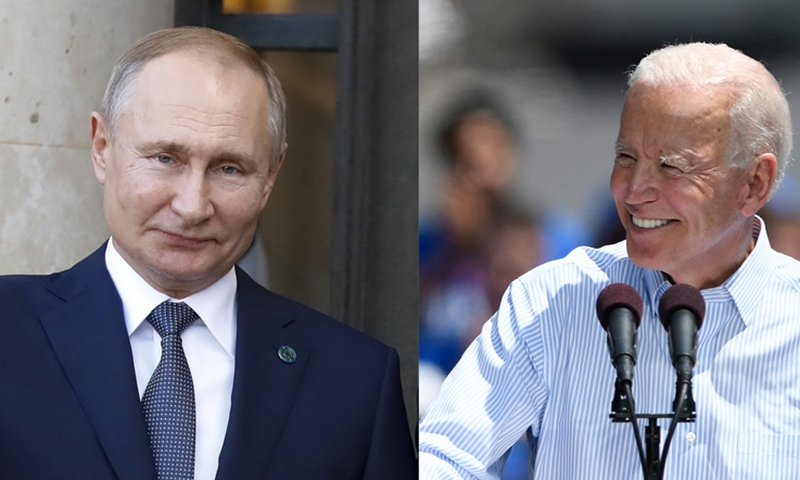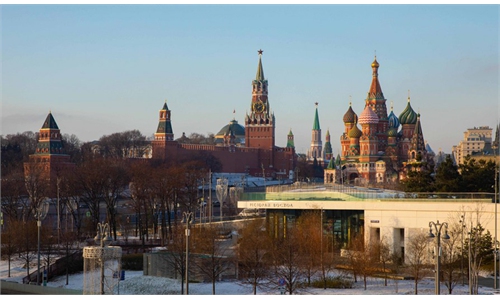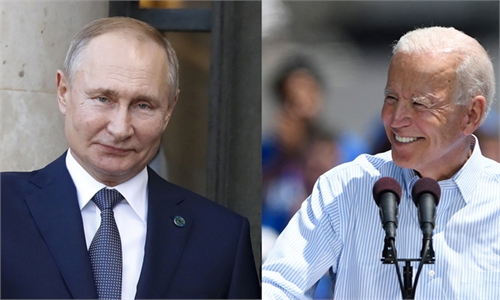
Xinhua file photos of Russian President Vladimir Putin (L) and U.S. President Joe Biden
Russian President Vladimir Putin had a telephone conversation with his US counterpart Joe Biden at the invitation of the latter on Tuesday. The two leaders discussed the current status of bilateral relations and hot topic issues of the international agenda in detail. This is the second call between the two.The Russia-US relationship is a very important one in today's world. In recent years, the two countries' relations have been complicated, and unfriendly. This has something to do with Washington's perception of Moscow. From Barack Obama to Donald Trump and now to Joe Biden, the US has implemented continuous containment policies against Russia. After Biden took power, he dealt with Russia together with the EU and NATO. However, Russia has long adhered to its core interests, and will not easily give in.
But now, the US and the West cannot solve many major global issues without Russia's participation. For example, on issues such as anti-terrorism, the Middle East, UN reform and the COVID-19 fight, Russia plays an essential role. Thus, by inviting Putin to the phone call, Biden may want to ease the tensions. Due to long-term containment of the West, Russia also needs to communicate with the US and other Western countries.
The tone of the White House's statement about the conversation was far harsher than that of Kremlin's. It said the US will "act firmly in defense of its national interests" in response to Russia's "cyber intrusions and election interference." But Russia's statement did not mention this. Instead, it emphasized more on the two sides' consensus.
As always, the US is playing the cards of "cyber intrusions and election interference." However, Russia may still want to ease tensions with the US and other Western countries, because it is facing specific challenges. On issues including domestic economy, production lines and stability in the Middle East, Moscow has the need to ease tensions with the West since they may cause unpredictable consequences.
During the phone talk, Biden expressed interests in interaction with Russia on pressing matters such as "ensuring strategic stability and arms control, Iran's nuclear program, the situation in Afghanistan, and global climate change," according to the Kremlin.
There is room for the two sides to talk on these issues. Washington needs cooperation with other major powers worldwide, or else it would be hard for the US alone to solve the problems. Russia also hopes to play a bigger role on these major global affairs. But still, if the two countries' major geopolitical conflicts are not resolved, it may also be hard for them to reach a high degree of agreement.
During their call, Biden proposed a summit meeting in a third country in the coming months to discuss the "full range of issues" facing the US and Russia, according to the White House. But even if there is a summit, people cannot expect for the achievements too much, because the two sides have fundamental conflicts that are very thorny.
For example, Washington has been supporting many of Ukraine's moves. According to the White House's statement, Biden emphasized the US' "unwavering commitment to Ukraine's sovereignty and territorial integrity" and voiced concerns over "the sudden Russian military build-up in occupied Crimea and on Ukraine's borders." On April 7, the Kremlin said that Russia would keep military forces near the border with Ukraine and it could take "measures" if necessary.
The US and Russia have been in a tit-for-tat conflict on the Ukraine issue and the US' attitude did not change during the latest phone call. The Ukraine issue could be fully triggered at any moment.
Since the Ukraine issue concerns Russia's core interests, Moscow will never give in. If Ukraine joins NATO, then Moscow will see it as a major security threat since NATO's scope would be extended to Russia's own doorsteps, which is unacceptable. Thus, by suggesting a personal summit meeting with Putin, Biden may regard it as a diplomatic measure to manage crises. However, it may be hard for the two sides to reach substantive results since they need more in-depth exchange of interests and discussions. The easing of Russia-US relations has not yet reached that point.
The author is an associate research fellow at the Institute of Russian, Eastern European and Central Asian Studies under the Chinese Academy of Social Sciences. opinion@globaltimes.com.cn


